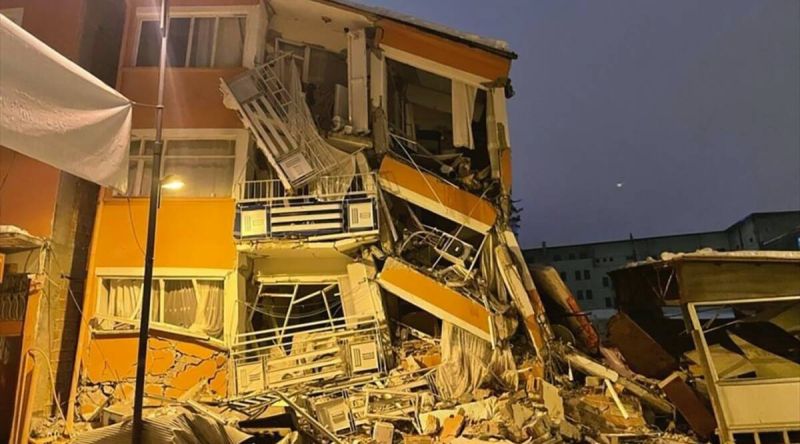- OIC Deeply Regrets UNSC Failure to Accept Palestine as UN Member |
- Retaliatory spiral in Middle East must end, says UN chief |
- Rakhine State once again becomes a battleground: UN HR Chief |
- No political case filed against BNP men: PM Hasina |
- Iran fires at attack drones near Isfahan air base, nuke site |
Turkey earthquake is country's worst disaster in 84 years - Erdogan

The death toll from a strong earthquake in south-eastern Turkey, near the Syrian border, has exceeded 2,300 people across both countries.
Turkey's disaster agency said more than 1,500 people died there, while it is estimated that 810 people died in Syria.
Those numbers are still expected to rise as rescuers comb through mountains of rubble in freezing, snowy weather.
It is Turkey's worst disaster in decades, the country's president said.
The US Geological Survey said the 7.8 magnitude tremor struck at 04:17 local time (01:17 GMT) at a depth of 17.9km (11 miles) near the city of Gaziantep.
Seismologists said the first quake was one of the largest ever recorded in Turkey. Survivors said it took two minutes for the shaking to stop, reports BBC.
Twelve hours later, a second quake, which had a magnitude of 7.5, hit Turkey's Elbistan district of Kahramanmaras province.
An official from Turkey's Disaster and Emergency Management Authority said it was "not an aftershock" and was "independent" from the earlier quake.
Turkey lies in one of the world's most active earthquake zones. President Recep Tayyip Erdogan said Monday's disaster was the worst the country had seen since 1939, when the Erzincan earthquake in eastern Turkey killed nearly 33,000 people.
However in 1999 there was another deadly quake which killed more than 17,000 in Turkey's north-west.
One Kahramanmaras resident, Melisa Salman, said living in an earthquake zone meant she was used to "being shaken", but Monday's tremor was "the first time we have ever experienced anything like that".
"We thought it was the apocalypse," she said.
Many thousands of people have been injured - with at least 5,385 people hurt in Turkey and 2,000 in Syria.
Many of the victims are in war-torn northern Syria, where millions of refugees live in camps on both sides of the Syria-Turkey border. There have been dozens of fatalities reported in rebel-held areas.
Thousands of buildings have collapsed, and several videos show the moment they fell, as onlookers ran for cover. Many buildings that were four or five storeys high are now flattened, roads have been destroyed and there are huge mountains of rubble as far as the eye can see.
Among the buildings destroyed was Gaziantep Castle, a historical landmark that had stood for more than 2,000 years.
And a shopping mall in the city of Diyarbakir collapsed, a BBC Turkish correspondent there reported.
Turkey's energy infrastructure has been damaged, and videos have emerged showing large fires in southern Turkey. Social media users claimed they were caused by damage to the gas pipelines.
Turkey's energy minister Fatih Donmez confirmed there had been serious damage to the infrastructure, however did not mention the explosions.
The Turkish Red Crescent has called for citizens to make blood donations, and the organisation's president, Kerem Kınık, said on Twitter that additional blood and medical products were being sent to the affected region.
Following an international appeal for help, Turkey's President Recep Tayyip Erdogan said 45 countries had offered support.
The European Union is sending search and rescue teams to Turkey, while rescuers from the Netherlands and Romania are already on their way. The UK has said it will send 76 search and rescue specialists, equipment and rescue dogs.
France, Germany, Israel, and the United States have also pledged to help. Russian President Vladimir Putin has offered help to both Turkey and Syria, as has Iran.
Turkey's interior minister, Suleymon Soylu, said 10 cities were affected by the initial quake including Hatay, Osmaniye, Adiyaman, Malatya, Sanliurfa, Adana, Diyarbakir and Kilis.
School has been suspended in those cities for at least a week.
A volunteer with the White Helmets rescue group, which operates in rebel-controlled areas of north-western Syria, fought back tears as he described the devastation in Sarmada, near the border with Turkey.
"Many buildings in different cities and villages in north-western Syria collapsed," he told the BBC.
"Still now, many families are under the rubble. We are trying to save them but it's a very hard task for us.
"We need help. We need the international community to do something, to help us, to support us. North-western Syria is now a disaster area. We need help from everyone to save our people," he added.
Hours after the first earthquake, a toddler was pulled from the rubble in Azaz, Syria, dirty and bloodied but alive. Video shows rescuers running to get her out of the cold.
The earthquake was powerful enough to be felt as far away as Cyprus, Lebanon and Israel.
"I was writing something and just all of a sudden the entire building started shaking and yes I didn't really know what to feel," Mohamad El Chamaa, a student in the Lebanese capital, Beirut, told the BBC.
"I was right next to the window so I was just scared that they might shatter. It went on for four-five minutes and it was pretty horrific. It was mind-blowing," he said.
Rushdi Abualouf, a BBC producer in the Gaza Strip, said there was about 45 seconds of shaking in the house he was staying in.

